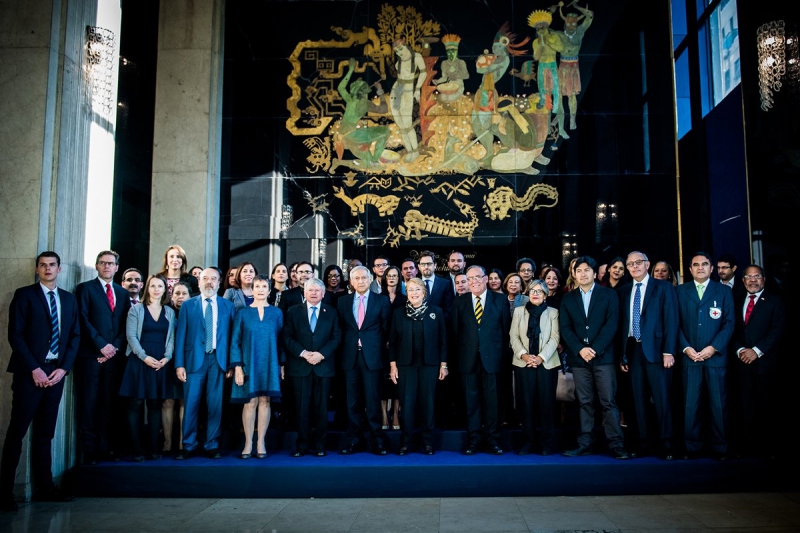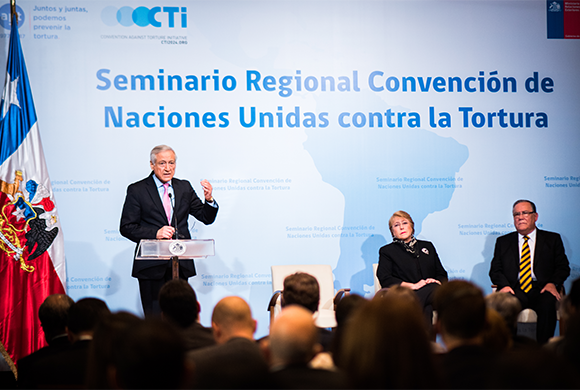
Location
Santiago, ChileAttendance
Invitation Only
Date & Time
Start: 05/04/17 00:00
End: 06/04/17 00:00
On 5-6 April 2017, 22 States from Latin America and the Caribbean gathered alongside a number of international and regional experts at a seminar held in Santiago, Chile, to share experiences on national anti-torture legislative and institutional frameworks. The Santiago meeting presented an important opportunity for Latin American and Caribbean […]

On 5-6 April 2017, 22 States from Latin America and the Caribbean gathered alongside a number of international and regional experts at a seminar held in Santiago, Chile, to share experiences on national anti-torture legislative and institutional frameworks.
The Santiago meeting presented an important opportunity for Latin American and Caribbean States to discuss legislative and institutional measures to implement the UN Convention against Torture and Other Cruel, Inhuman or Degrading Treatment or Punishment (UNCAT). More than 60 participants engaged in in-depth discussions over the two-day seminar, which was hosted by the Government of Chile as a core member of the CTI, and supported by the Association for the Prevention of Torture (APT).
Of the 22 States participating in the meeting, 4 are considering the benefits of ratifying UNCAT (Bahamas, Jamaica, Saint Lucia and Suriname) while 18 of the States are already parties to the Convention.* The event was also attended by CTI core States of Denmark, Indonesia and Morocco, as well as representatives of the UN Committee against Torture, the Inter-American human rights system, OHCHR, UNDP, ICRC, and from national human rights institutions, national preventive mechanisms and civil society.
At a high level opening ceremony, Chile’s President H.E. Michelle Bachelet, accompanied by Chile’s Minister for Foreign Affairs H.E. Heraldo Muñoz and Minister of Justice H.E. Jaime Campos, reflected on the many positive steps taken by Chile and other governments in the region to prevent torture and ill-treatment, while also encouraging action in areas where problems persist. She gave credit to the broad international consensus on the need for the definitive eradication of torture, as reflected in UNCAT as well as the Inter-American Convention to Prevent and Punish Torture, yet raised concern that there are too frequently unacceptable excuses for continuing out-of-date abusive practices. She recognised that: “The challenge remains of having adequate institutional arrangements for the prevention and eradication of all types of torture.”
In responding to this challenge, the agenda for the two-day seminar comprised sessions on a variety of issues pertaining to the development of legislative and institutional anti-torture frameworks. Already, many of the constitutional texts in the region explicitly incorporate a prohibition against torture, and establish guarantees that exclude it or refer to proscription of ill-treatment in various contexts. Five countries – Antigua and Barbuda, Brazil, Mexico, Uruguay and Venezuela – have enacted specific legislation criminalizing torture, while thirteen other States – including Chile – have included torture as a specific crime, through amendments to their Criminal Codes. In designing national legislative and institutional responses, it was noted that there is no one-size-fits-all but rather, to be effective, frameworks need to be grounded in and tailored to national contexts, including legal, political, and social systems and priorities. In this regard, participants praised the merits of engaging in multi-stakeholder consultations when developing such responses.
A particular focus of the seminar was on gendered forms of torture, which President Bachelet also emphasised in her opening remarks. It is clear that there are certain forms of gender-related violence that are actually torture and that these need to be reflected also in national legislation and policies. The meeting heard many good State practices from the region, including that countries had developed training and sensitization programmes for relevant stakeholders to overcome prejudices and stereotypes. It was noted that the UN Committee against Torture reinforces this approach, requesting information on gender aspects of torture prevention and redress in its reviews of State party reports.
The seminar made connections between the overall torture prevention agenda and the 2030 Agenda for Sustainable Development, to ensure coherence and inter-connectivity at both international and national levels. Finally, the meeting produced much goodwill between States to support and assist each other and to exchange further on these issues. Offers of support were also given by the CTI, APT, OHCHR and other global and regional partners.
The Chile seminar was followed on 7 April 2017 by a closed meeting with Caribbean States, in which the benefits and challenges of ratification of UNCAT were discussed. The CTI is hopeful that all Caribbean countries will become party to the Convention in the near future and is committed to supporting them take this next step.
Read President Michelle Bachelet’s speech here.

